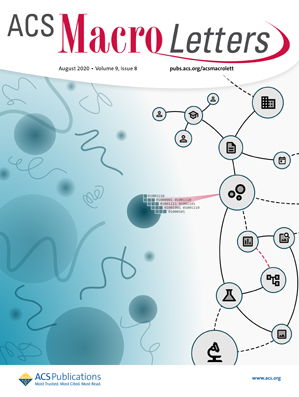Covalent Adaptable Polyester Networks Based on Citric Acid with Fast Dynamic Behaviors and Closed-Loop Recyclability.
IF 5.1
Q1 POLYMER SCIENCE
引用次数: 0
Abstract
Most covalent adaptable networks (CANs) based on citric acid (CA) exhibit low thermostability, low glass-transition temperatures (Tg), and poor mechanical properties. Moreover, their slow relaxation rates necessitate prolonged reprocessing time, resulting in issues such as degradation or side-reactions. Herein, a bicyclic tetracarboxylate (DMTE) derived from CA was prepared. A series of polyester CANs were prepared via catalyst-free melt-polycondensation of DMTE, CA, and 1,6-hexanediol (HDO). To our delight, the highly rigid DMTE simultaneously improved the Tg values and mechanical properties of the CANs based on CA. Furthermore, benefiting from its dissociative transesterification reaction (TER), the introduction of DMTE significantly improved their relaxation rates. This allows their reprocessing time to be significantly shortened to merely 10 s at 180 °C, compared to the long reprocessing time needed for the CAN solely based on CA (30 min). Lastly, these materials can be closed-loop recycled by catalyst-free methanolysis to recover the initial monomers in high yields.具有快速动态行为和闭环可回收性的柠檬酸共价自适应聚酯网络。
大多数基于柠檬酸(CA)的共价自适应网络(can)表现出低热稳定性、低玻璃化转变温度(Tg)和较差的机械性能。此外,它们缓慢的弛豫速率需要较长的再加工时间,从而导致降解或副作用等问题。本文制备了一种由CA衍生的双环四羧酸酯(DMTE)。采用DMTE、CA和1,6-己二醇(HDO)的无催化剂熔融缩聚法制备了一系列聚酯罐。让我们高兴的是,高刚性的DMTE同时提高了基于CA的can的Tg值和力学性能。此外,得益于其解离酯交换反应(TER), DMTE的引入显著提高了它们的弛豫速率。这使得它们的再处理时间在180°C下显著缩短至仅10秒,而仅基于CA的CAN(30分钟)所需的再处理时间较长。最后,这些材料可以通过无催化剂甲醇分解闭环回收,以高收率回收初始单体。
本文章由计算机程序翻译,如有差异,请以英文原文为准。
求助全文
约1分钟内获得全文
求助全文
来源期刊
CiteScore
10.40
自引率
3.40%
发文量
209
审稿时长
1 months
期刊介绍:
ACS Macro Letters publishes research in all areas of contemporary soft matter science in which macromolecules play a key role, including nanotechnology, self-assembly, supramolecular chemistry, biomaterials, energy generation and storage, and renewable/sustainable materials. Submissions to ACS Macro Letters should justify clearly the rapid disclosure of the key elements of the study. The scope of the journal includes high-impact research of broad interest in all areas of polymer science and engineering, including cross-disciplinary research that interfaces with polymer science.
With the launch of ACS Macro Letters, all Communications that were formerly published in Macromolecules and Biomacromolecules will be published as Letters in ACS Macro Letters.

 求助内容:
求助内容: 应助结果提醒方式:
应助结果提醒方式:


